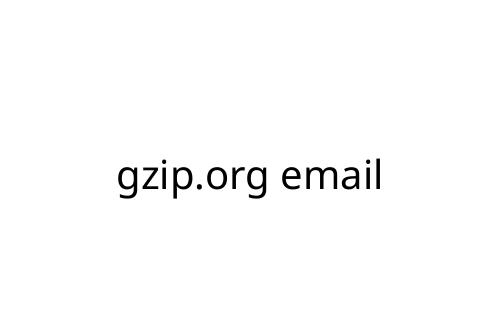gzip.org email
If you've ever searched for tools to compress files or speed up data transfer, you've likely come across gzip.org. But what about "gzip.org email"? It's a natural question, given how many services use emails for support, notifications, or user accounts. This article explores what you need to know about gzip.org email, its relevance, and best practices for communicating about gzip or contacting those behind the project.
What is gzip.org?
Gzip.org is the official web presence of gzip, a free, open-source data compression utility. It's widely known for its .gz file format and its essential role in compressing web traffic, streamlining software distribution, and reducing storage requirements. Maintained by the GNU Project, gzip stands out for its reliability and broad adoption in Unix-like systems.
Is There a gzip.org Email Address?
It’s common to look for a direct email address—perhaps support@gzip.org or info@gzip.org—if you want help or information about gzip. However, gzip.org operates more like an open-source software project than a commercial service. There is no straightforward customer support inbox. Instead, inquiries and contributions are managed through community channels.
The website lists contact options and ways to engage with maintainers or the GNU umbrella project. These usually include:
- Mailing lists: Most open-source projects, including gzip, use public mailing lists for discussions, problem reports, and feature requests. Addresses can be found on the official site or linked documentation.
- Bug trackers: Technical issues or bugs are often reported via platforms like Savannah (GNU’s bug tracker), not direct email.
- General GNU contact: For administrative questions, you might try the general info@gnu.org address, but it’s not targeted at gzip.
Pros and Cons of Email Communication
Pros
- Direct communication: Email feels personal and allows for detailed questions.
- Record-keeping: You can reference past conversations.
Cons
- Slow response times: Volunteer-run projects like gzip may not prioritize answering emails.
- Lack of central support: There may not be a dedicated team monitoring a gzip.org email.
- Public forums are standard: Mailing lists ensure transparency and collective knowledge-building.
Practical Communication Tips
- Check the website first: Look for a “Contact” section or support links on gzip.org. Most answers, whether for technical issues or collaboration, can be found there.
- Use the relevant mailing list: If your question is technical or developmental, join and write to the appropriate mailing list.
- Be specific in your subject line: This helps volunteers and developers address your query effectively.
- Be patient and courteous: Responses from open-source communities can take time.
Final Thoughts
While "gzip.org email" might suggest a dedicated inbox, the reality is more community-driven. Direct email contact is rare; interaction happens through mailing lists and public forums. For technical support or contribution inquiries, review the resources on gzip.org and engage with the community channels they provide. This approach offers better transparency, shared expertise, and a collaborative experience that defines open-source projects like gzip.

